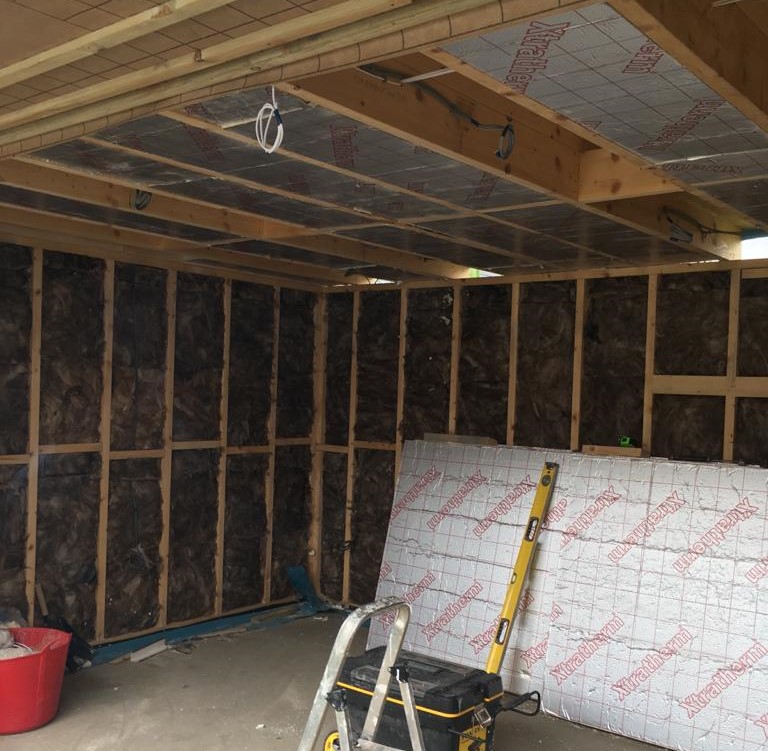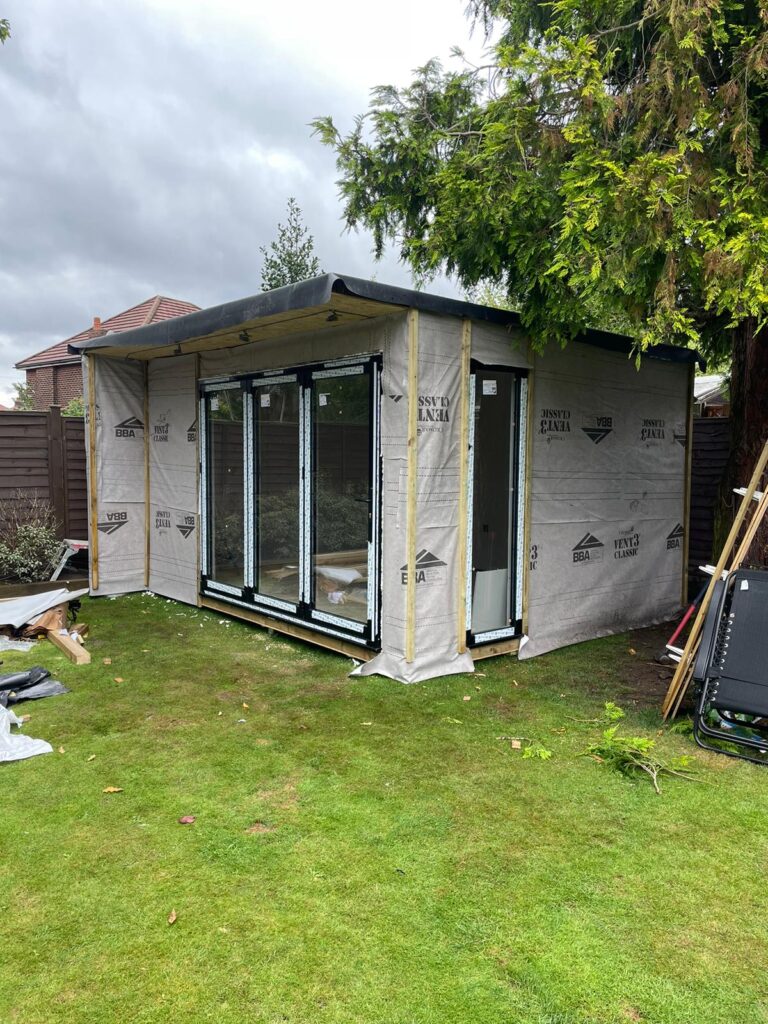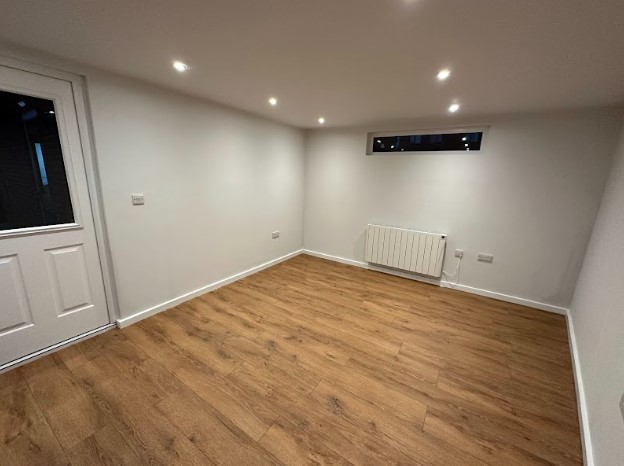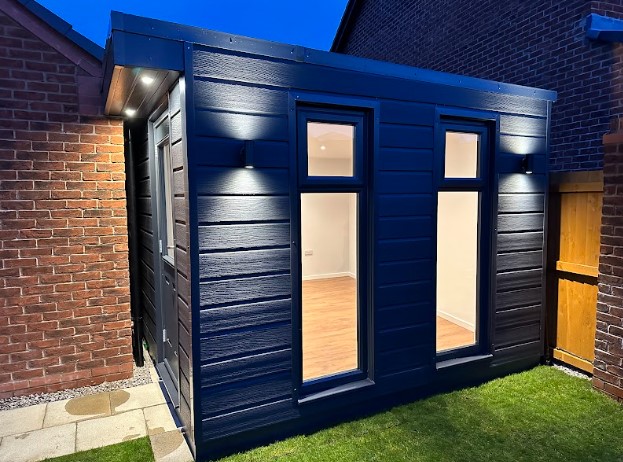We all know how hard it can be sometimes to a find peace and quiet. This is especially true in a busy household.
It can also be true in your separate garden room. Whether you’re working in your garden office, enjoying a book in your chill out space or working out in your fitness area, unwanted noise isn’t usually welcome.
So, how do you reduce the noise in your garden room?
There are several ways to do this. One of the first ports of call in reducing garden room noise should be insulation. With an insulated garden room you can really create a tranquil, secluded space, away from the hustle and bustle of daily life. They’ll even help to keep the noise in if you like to blast out your rock music as you work out!
This post will take a look at reducing garden room noise and the steps you can take to keep this to a minimum.
Why does insulation matter in reducing noise?
When it comes to reducing noise in a garden room, insulation plays a key role.
A non-insulated garden room can feel like a glorified outdoor shed, with thin walls that do little to stop external sounds from piercing through. Without insulation, noise from traffic, sirens, neighbours and even the wind can easily be heard in your garden room.

On the other hands, a well-insulated garden room provides a solid barrier that blocks and absorbs sound, significantly reducing noise pollution from outside. This is because insulation acts as a buffer. It dampens the vibrations of sound waves as they pass through walls, floors and ceilings.
By insulating key areas of the structure, including the roof, walls and floor, you can greatly reduce the amount of noise that makes its way into the room. Read more on the difference between insulated vs non insulated garden rooms here.
Naturally this does add to the cost of a garden room, but it’s a necessary step if you want to use the space across the year. For example, an insulated garden office is a no-brainer if you intend on making the most of your build.
Insulation and heat loss
Insulating the the roof, walls and floor not only helps to block noise, but also creates a much more energy-efficient and comfortable space. This is because these are the major areas where heat is lost:
- Roof and loft space – Up to 25-30% of heat (and sound) escapes through the roof.
- Wall space – Without proper insulation, 35-40% of heat and noise can pass through the walls.
- Floor space – 10-25% of heat and sound loss occurs through the floor.
Insulation means you can heat a garden room much more efficiently – saving you money on your energy bills.

Best types of insulation materials for noise reduction
Choosing the right insulation material for your garden room can greatly improve its soundproofing ability. Here are some of the best materials for both reducing noise, which also happen to be good, sustainable options.
Wood Fibre
Made from waste wood fibres, wood fibre insulation is a biodegradable material with strong soundproofing properties. It’s available in both rigid boards and flexible batts, making it versatile for different insulation needs. It also offers a natural, eco-friendly option for reducing noise.

Fiberglass
Fiberglass is one of the most commonly used insulation materials. It’s affordable and provides good sound reduction, especially when installed in walls and ceilings. However, it’s less effective than some other materials for low-frequency sounds but still remains a popular choice for reducing general noise transmission.
Mineral Wool
Mineral wool, also known as rock wool, is denser than fiberglass, which makes it excellent for both sound absorption and fire resistance. It’s highly effective in walls, floors and roofs, providing top-tier noise reduction by dampening sound vibrations.
You can get recycled glass mineral wool versions which add to your eco-friendly credentials.

Cork
Cork is an exceptional insulator that offers both thermal and acoustic benefits. Its dense structure blocks sound, while its moisture resistance makes it perfect for a variety of applications. Though slightly more expensive, cork’s long lifespan and sustainability make it a strong choice for noise reduction.
Cellulose
Cellulose is made from recycled paper and provides good soundproofing in tight spaces. It’s a cost-effective, eco-friendly solution that fits snugly into walls and floors, absorbing sound and preventing it from entering the room.
Recycled Plastic
This material is made from post-consumer recycled plastic bottles and is VOC-free, long-lasting and effective at blocking sound. It’s a great option for floors and walls, with the added benefit of reducing plastic waste.

Recycled Rubber
Recycled rubber, made from old tyres, is a durable and highly effective sound insulator. It’s particularly useful for reducing noise from external sources like traffic, making it an ideal choice for garden rooms located in busy areas.
Acoustic Panels
Acoustic panels are specifically designed for sound absorption and can be installed on walls or ceilings to reduce noise within a room. While they don’t provide thermal insulation, they are excellent at dampening internal noise, making them a great addition to a garden room intended for work or entertainment.

How does installing noise reducing insulation work?
To achieve the best noise reduction, it’s crucial that insulation is properly installed. This usually requires the expertise of a professional contractor, who can assess your garden room and determine the best materials for your needs – of course, at Lux we do all of this for you.
The process usually includes:
- Assessment – Evaluating the space and determining the most suitable insulation materials for noise reduction.
- Preparation – Cleaning and sealing any gaps or cracks to prevent air leaks.
- Installation – Installing insulation in the walls, floor and roof.
If noise reducing insulation isn’t going to be enough, you may consider properly soundproofing your garden room. We did this recently for a customer who wanted to use their garden room as an entertainment space with the odd karaoke session.
Case Study: Soundproofed Entertainment Garden Room

Recently, we built a 4.5m x 3.5m garden room specifically designed as an entertainment and karaoke space. The room featured two 600mm floor-to-ceiling windows, a composite door and composite double embossed shiplap cladding in Anthracite grey for a stylish finish.
To make sure any loud music and karaoke sessions didn’t disturb the neighbours, we fully soundproofed the walls and roof using high-quality materials.
The combination of insulation and soundproofing significantly helped to contain noise within the room, creating a perfect environment for entertainment without disturbing the peace outside.

Benefits of Noise Reduction in Garden Rooms
Reducing noise in your garden room offers several important benefits:
- Improved concentration – A quiet space helps you stay focused, improving productivity. This is important if your garden room is used as an office or workspace.
- Enhanced relaxation – A peaceful environment helps you feel more relaxed and reduces stress. This is important if your garden room is used a chill out space for reading or even as your own mini spa retreat.
- Increased property value – A well-insulated garden room adds to your home’s value, making it more appealing to potential buyers.
You can read up on more benefits of building a garden room here.
Next steps with your garden room
Insulation is one of the most effective ways to reduce noise in garden rooms. With the right insulation materials and proper installation, you can block out or significantly reduce most external noise and enjoy a quiet retreat year-round.
Whether you use your garden room for work or relaxation, reducing noise is key. Get in touch with us today to learn more about your insulation options and receive a free quote for your garden room project.
Here at Lux, we’re specialists when it comes to building bespoke garden rooms, designed and built to your needs. Check out our garden room gallery and garden room ideas post for some inspiration.
FAQs
What’s the best insulation material for reducing noise in garden rooms?
Mineral wool, fibreglass and cork are among the top choices for noise reduction, thanks to their density and sound absorption properties.
How much does insulation cost for a garden room?
Costs vary depending on the size of the garden room and the type of insulation used. For an insulated permanent structure that will last you for decades, prices start from around £15,000 – compared to an extension, this is much cheaper.
You can find more information on garden room costs here.
Will insulation also regulate the temperature in my garden room?
Yes, insulation helps to maintain a consistent temperature in your garden room, keeping it comfortable throughout the year.
Can I add extra soundproofing measures in my garden room?
Absolutely. You can add soundproof curtains or acoustic panels to further reduce noise.
Is planning permission required for a garden room?
In most cases, planning permission is not required for garden rooms, as they often fall under permitted development rights. However, the rules can vary depending on the size, height and location of the structure. For example, if your garden room is larger than 30 square metres, exceeds a certain height or is placed near the property boundary, planning permission may be needed.
At Lux, we take care of any planning permission requirements on your behalf.

